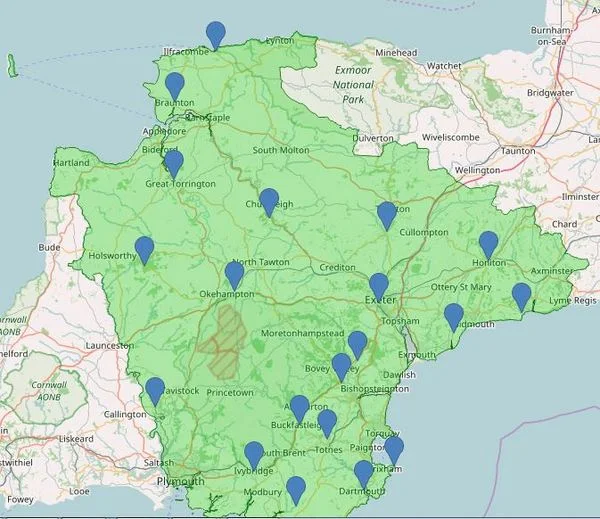This September people from North Devon are being invited to celebrate some very special local wildlife at one of 25 ‘Bat Festival’ events being held across the county.
The Festival, which is now in its fourth year, is organised by the Devon Greater Horseshoe Bat Project, which is led by the charity Devon Wildlife Trust. Two North Devon events are being planned. Both are ‘bat walks’ where people can discover the secret lives of these fascinating mammals. Both take place in Braunton, the first on Thursday 12 September at 7.30pm; the second on Thursday 19 September at 7pm. Both leave on foot from Braunton’s Countryside Centre. They are free to attend.
The Devon Greater Horseshoe Bat Project, which has been running since 2015, is supported by the National Lottery Heritage Fund. Working alongside local farmers, the community and other countryside organisations, the project is securing a future for what is one of Devon’s most endangered animals.
Ruth Testa, Project Manager of the Devon Greater Horseshoe Bat Project, said:
“We want to welcome as many local people as possible to our fourth and biggest ever Bat Festival! Devon is an vital refuge for the greater horseshoe bat. About a third of the UK’s population of this special mammal live here, making the county a real stronghold for them. The Bat Festival is a wonderful opportunity for everyone to learn about and celebrate local bats. The help of local communities to protect greater horseshoe bats is more important than it has ever been as the species has declined by more than 90% in the last 100 years.”
North Devon Coast Area of Outstanding Natural Beauty (AONB) is helping the project run its Bat Festival events. Dave Edgcombe is the AONB’s Project Officer and said:
“We are delighted with the exciting bat events that are being staged across Devon with the project’s partners. The Bat Festival gives everyone an opportunity to find out more about the secret lives of bats. Here in North Devon there are 2 bat detecting walks in Braunton – do join us for some bat spotting!"
Full details about all 25 of the Bat Festival’s events can be found at www.devonbatproject.org/events
The Festival, which is now in its fourth year, is organised by the Devon Greater Horseshoe Bat Project, which is led by the charity Devon Wildlife Trust. Two North Devon events are being planned. Both are ‘bat walks’ where people can discover the secret lives of these fascinating mammals. Both take place in Braunton, the first on Thursday 12 September at 7.30pm; the second on Thursday 19 September at 7pm. Both leave on foot from Braunton’s Countryside Centre. They are free to attend.
The Devon Greater Horseshoe Bat Project, which has been running since 2015, is supported by the National Lottery Heritage Fund. Working alongside local farmers, the community and other countryside organisations, the project is securing a future for what is one of Devon’s most endangered animals.
Ruth Testa, Project Manager of the Devon Greater Horseshoe Bat Project, said:
“We want to welcome as many local people as possible to our fourth and biggest ever Bat Festival! Devon is an vital refuge for the greater horseshoe bat. About a third of the UK’s population of this special mammal live here, making the county a real stronghold for them. The Bat Festival is a wonderful opportunity for everyone to learn about and celebrate local bats. The help of local communities to protect greater horseshoe bats is more important than it has ever been as the species has declined by more than 90% in the last 100 years.”
North Devon Coast Area of Outstanding Natural Beauty (AONB) is helping the project run its Bat Festival events. Dave Edgcombe is the AONB’s Project Officer and said:
“We are delighted with the exciting bat events that are being staged across Devon with the project’s partners. The Bat Festival gives everyone an opportunity to find out more about the secret lives of bats. Here in North Devon there are 2 bat detecting walks in Braunton – do join us for some bat spotting!"
Full details about all 25 of the Bat Festival’s events can be found at www.devonbatproject.org/events















